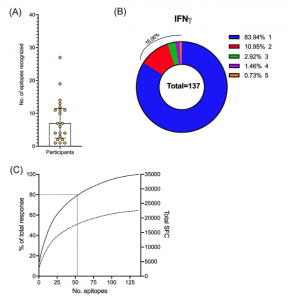Tuberculosis (TB) remains a major global health threat, claiming over 1.3 million lives annually. While existing vaccines like BCG offer some protection, they’re not fool proof. But there may be hope. A recent study uncovered new insights into how our immune system fights TB (Figure 1).
This research highlights the critical role of T cells, our body’s specialized soldiers. These cells don’t attack the bacteria but target specific markers called epitopes. Understanding these epitopes is crucial for developing better vaccines and treatments.

Figure 1: Breadth and dominance of epitopes in mid-treatment ATB participants. A Number of epitopes recognized by each participant. Each dot is one participant, n = 21; median ± interquartile range is shown. B Distribution of recognized epitopes by the number of participants recognizing each epitope. C Epitopes ranked based on the magnitude of response (solid line – % of total response, dotted line – total spot forming cells (SFC)). Black dotted lines indicate the top 55 epitopes. Source data are provided as a Source data file.
The study analysed T cells from patients across three continents, capturing a wide range of genetic and environmental factors influencing immune responses. This global approach led to the discovery of 137 unique T cell epitopes, with some being recognized by immune systems across different populations. The study also compared T cell activity in active TB patients with healthy individuals. Remarkably, researchers identified distinctive patterns in T cell responses, potentially paving the way for a new diagnostic tool. Imagine detecting active TB by simply analysing immune system activity – a significant leap in early diagnosis and treatment.
This research is a significant step forward in our fight against TB. By understanding how T cells recognize and combat the bacteria, we can develop more effective diagnostics, vaccines, and therapies. While further research is needed, these findings offer a beacon of hope in the battle against this global health challenge.
Journal article: Panda, S., et al., 2024. Identification of differentially recognized T cell epitopes in the spectrum of tuberculosis infection. Nature Communications.
Summary by Stefan Botha










